

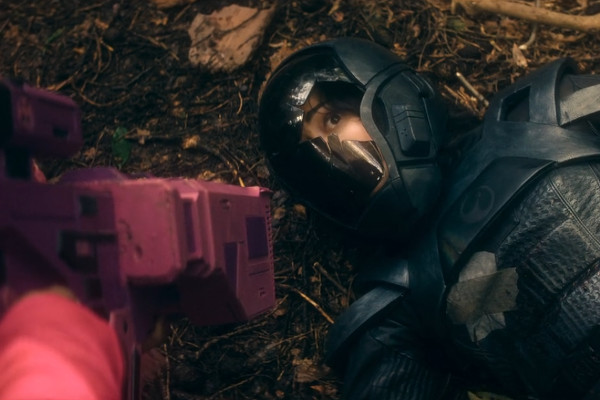
Maybe it's just my expectations were lowered, or this time round I knew what to expect. But this sequel episode to USS Callister, one of the bottom three episodes in my opinion (and in not many other opinions) rose massively above the disappointing original. Yes, I'm surprised it ranked so highly, too. Some of the concepts about being trapped in a prolonged existence have been done before, but while the original seemed like a poor man's Galaxy Quest, this one had its own vision. The comedic tone was there, but not as jarring, and the situations were more engaging.
The project was actually conceived as a USS Callister mini-series according to director Toby Haynes, but the writers strike put paid to some plans, and it was reworked as a movie. At 88'42m, it just falls short of the 89'09m of Hated in the Nation, making it the second-longest episode to date. It fills that runtime well, with multiple plot lines and explorations of various states of existence.

Having San Junipero only scrape into the top ten (and directly below a traditionally far less popular episode) saw The Anorak Zone get a bit of flack on Twatter (now "X") when this article was first launched. Since then it's fallen even further out of the top ten, while the "traditionally far less popular" episode now ranks two places above it, and has generally held firm. However, I hope that justification for this, at least, is given, so that you may not agree with the placing, but you can at least understand my reason why.
San Junipero is/was arguably the most atypical Black Mirror episode ever made. A series with a bleak, blackly-comic outlook where the karmic balance is always open to question, this was the only story until Hang The DJ to feature a truly happy ending.
It's easy to assume, with his cynical on-screen persona, that Charlie Brooker lacks genuine emotion, but this is his warmest and most sincere episode. The man who was partly responsible for television such as Screen Wipe, Brass Eye and Nathan Barley is nowhere to be found here, a sometimes heart-breaking yet charming tale of a relationship in a virtual afterlife between two women.
As both women face (and experience) death in real life, then there's a bittersweet feel to events, but it lacks the dark, ironic edges that normally make up a Black Mirror experience. San Junipero is a tale that champions both love and a homosexual relationship, and is justly lauded. Yet in praising an episode where everything, after a fashion, works out well in the end, you have to ask yourself... have you switched on the wrong series by accident?
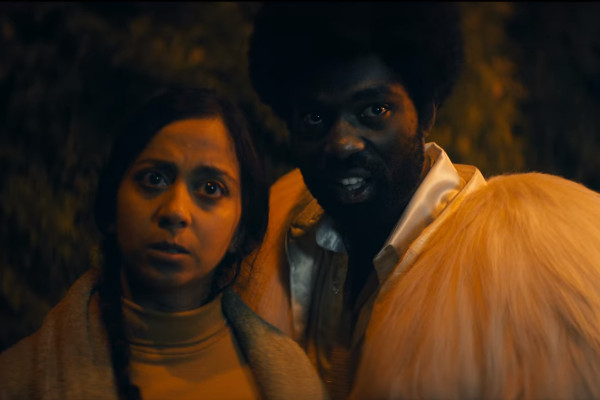
You can make an argument that not a single one of the season six episodes is truly Black Mirror. At a stretch, you might even suggest there hasn't been a pure Black Mirror episode since 2017.
So, back to the Charlie Brooker quotes from The Radio Times (and taken from a Q & A at the BFI): "This season I started out doing some with a very different take - a Red Mirror film, and almost like a crime and horror-led sister label, so to speak."
While this story of a demon demanding sacrifices or the world will end very definitely isn't a Black Mirror episode, it at least gets a pass, in that it's the only one of the "not really" episodes to go out under a different label. Opening with Black Mirror presenting "a Red Mirror film", it at least has the decency to set out its stall from the outset, ensuring you're at least given a get out from the "is-it-or-isn't-it?" questions.
So why does this one rank so high? Is it the chemistry between Anjana Vasan as lead character Needa and Paapa Essiedu as the Boney M-inspired Demon? Maybe it's the quite intriguing plot, with some funny lines? Or maybe it's just overrated because it's an episode that features Sapphire & Steel playing on someone's television (albeit in May 1979, two months before it actually began.) Whatever it is, this edition has something, even if there's the nagging feeling that "something" won't extend to too many repeat views. We'll see.
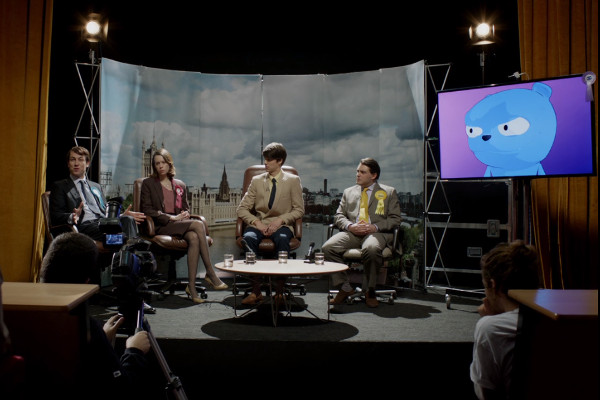
The concept of an urban, technology-based take on the anthology format is a good one, though ultimately has a limited lifespan. It perhaps explains why the series went to Netflix after this instalment (barring one Christmas special) as already, just half a dozen episodes in, the ideas appear to be repeating themselves, at least thematically.
It's not that The Waldo Moment is actually a bad episode. In fact, it's a very good one. If you can get past the concept of a foul-mouthed cartoon bear having mainstream crossover appeal with the public, then the story is well told and well-acted. In isolation it's actually a great and underrated piece of television, it's just that in the context of the series it did feel like the show was treading over old ground.
What helped push the episode further up the rankings (and in 2025 only just slipping out of the Top 10) is how unwittingly prescient it became in depicting a political candidate who engaged the electorate via negativity and abuse. What seemed at the time a slightly flat episode has become elevated into something more, and, rewatched with fresh eyes, it's an instalment that has aged well, depicting a world that seemed too far-fetched, but has ultimately become our reality. Perhaps the only disappointment is that the YouTube video "A dog farting the theme tune to Happy Days" is entirely fictional.
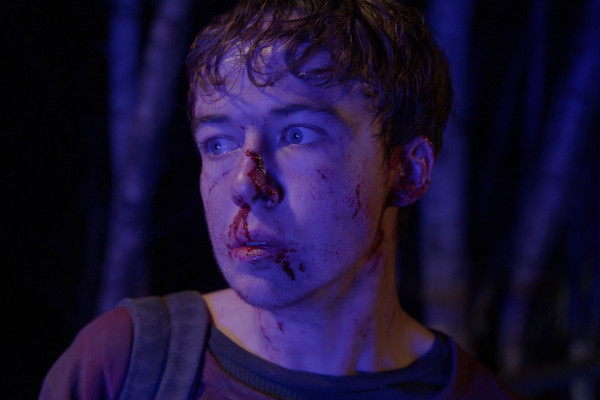
Shut Up and Dance received mixed critical reviews, whereby a final twist - thematically similar to that of the earlier White Bear - left viewers feeling troubled with the episode's content. It contains strong lead performances from Alex Lawther as Kenny, a young boy blackmailed when filmed via his internet webcam, and Jerome Flynn as Hector, another blackmail victim who he's forced to team up with. Co-written by William Bridges - here credited as "Will" - it's astonishing to think that such a dark, distressing episode was written by the same team behind USS Callister.
The episode drops a little due to the ending, but not in the way one might think: having hard-hitting, line-crossing twists is what Black Mirror has been all about from its very inception. What harms is that said twist is then spelt out to the viewers via a phone call after having already been heavily implied... although Black Mirror could never perhaps be accused of being subtle, it seems as if the Netflix audience wasn't credited with the intelligence to work it out. There's also the unexplained plot twist of how, in their enforced "fight to the death", slightly built 5'7 Kenny somehow manages to kill a six foot man.
Yet the main reason it ranks so relatively low in this list is because nothing that happens in the episode follows the series' self-imposed "future shocks" remit. The entirety of Shut Up and Dance could conceivably take place now, with no future technology or SF element involved. As a result it's a strong, gripping thriller with a devastating final twist... but it's hardly an episode of Black Mirror at all.
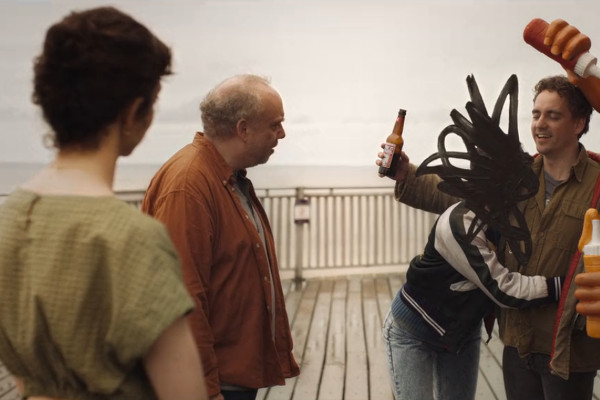
Yes, the best episode of season seven has a title that appears in lowercase and with a full stop at the end of it - we've got to be screen accurate, here. Paul Giamatti delivers an expectedly strong performance as an isolated man exploring his memories of a past, broken relationship.
Charlie Brooker made his career as a professional cynic (though his heart wasn't in it), and sometimes real emotion seems to evade him. It's perhaps telling that this one has a co-writer, with Ella Road, and feels more substantial, less "bitty" as a result, more developed as a full story.
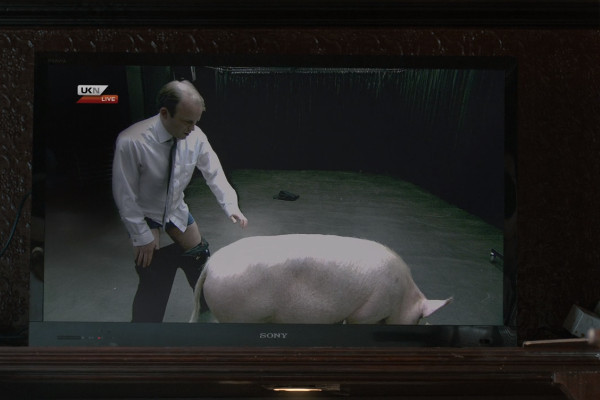
The concept that someone would kidnap a member of the Royal Family and blackmail the Prime Minister into having sex with a pig on live TV is a far-fetched idea, but made scarily plausible in this opening episode. Brooker's media-savvy is on show from the outset, as he depicts the various activity that would engineer such a situation, not least the all-important polls. Sadly, it may have been too much for some viewers, the undeniable "shock value" off-putting... while "opening nights" always attract a spike in viewing figures, a quarter of the 2 million that tuned in to this debut had deserted the programme by the second week.
It's now, of course, impossible to discuss this episode without referring to the fact that a real UK Prime Minister was later accused of penetrating a dead pig's mouth as part of an initiation ceremony. Brought to the press four years after this episode aired, the charges were denied, but brought retroactive attention to a controversial instalment.